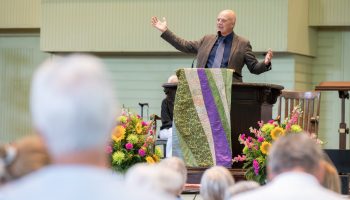
Column by Mary Lee Talbot
“I am a foodie. I bet this is the first sermon you have heard that begins with this statement,” said the Rev. Frank M. Yamada.
Yamada lovingly set the scene. “I enjoy watching excellent food being prepared while eating: the food just tastes better. I enjoy the artistry of cooking.” He and his wife Melissa enjoy watching “Chef’s Table,” and he described the opening of one episode.
The music was from Vivaldi’s “The Four Seasons,” the winter movement. There were aromatic leaves on a fire, a cauldron of boiling viscous liquid, the chef’s hands caressing the ingredients, a knife being sharpened. There was a montage of faces of chefs thinking, meditating on their craft.
“It ended with a visual display of art, a culinary eucharist,” he said. “The rhythm, texture and beauty of the food was not just cooking, it is a sacred craft. It tells the story of the chef, of being at home, feeling the craft in body, taste and beauty.”
He preached at the 9:15 a.m. Tuesday morning worship service in the Amphitheater. His sermon title was “The Beauty of Holiness — The Art of Prayer and Prayer as Art,” and the scripture text was Psalm 96.
Yamada told the congregation that people ask for a salve for the soul in our current time, and he promised that the psalmist would get there and would work toward that salve in their own time. He noted that there is a time signature in worship, an aesthetic in the prayers, in the words and music of the hymns, and the beauty of the house of worship.
Yamada’s sermon was about Psalm 96, an enthronement psalm, where God is king over all creation, and the focus in the psalm is on the character of God — set apart, holy, for whom there is no equal. It is about God’s otherness. Verse 6 describes that otherness: “Honor and majesty are before him; / strength and beauty are in his sanctuary.” Yamada also cited verse 4, “For great is the Lord and greatly to be praised; / he is to be revered above all gods.”
He continued, “Don’t miss the artistry, the art and poetry through the rhythm and meter. The most salient feature in these verses is the parallelism — a word invented by scholars, not artists.”
In verse 1, “O sing to the Lord a new song; / sing to the Lord, all the earth,” Yamada noted that to the Hebrew ear, “that is art, it is more than just words, it lifts the soul. It is a new song, an exhortation for all creation to sing.” He likened the aesthetic to the call and response of the Black church.
He recalled the prayer Bishop Eugene Taylor Sutton used for the Monday worship service. The rhythm of “How Long, Not Long” in Martin Luther King Jr.’s address captured the artistry of the words and the feeling.
In verse 9 in the New Revised Standard Version (Updated), the Hebrew words, behadrat kodesh, are translated as “holy splendor,” but Yamada prefers the translation “beauty of holiness.” He said in Psalm 96, holiness is set apart not just for God’s otherness or for humans to keep clean. It means the “experience of majesty, like looking at the Grand Canyon or a sunset over Lake Erie.”
The phrase, the beauty of holiness, describes what it is like to experience beauty and to describe the beauty of God’s holiness. The title of his sermon “The Beauty of Holiness — The Art of Prayer and Prayer as Art” should remind the congregation that the psalms are artful prayers that praise through worship and plead through art.
“Artists and musicians have told me that when they are creating, it feels like an act of prayer,” Yamada said. “Their work is a co-creation with God the creator.” Their anthems sing God’s praise, and their art embodies holiness and reflects God’s majesty. The beauty of prayer helps bridge the sacred and the profane.
The beauty of holiness can help replace the ugliness of nationalism and other evils in the present day. “It is good work to see the holy in the profane,” he said.
Yamada closed with a quote from novelist and preacher Frederick Buechner: “Listen to your life. See it for the fathomless mystery it is. In the boredom and pain of it, no less than in the excitement and gladness: touch, taste, smell your way to the holy and hidden heart of it because in the last analysis, all moments are key moments, and life itself is grace.”
The Rev. Rachel Erin Stuart, senior pastor of Hurlbut Memorial Community United Methodist Church, presided. The Rev. Lawrence Malakie, a retired chaplain at Attica State Prison, read the scripture. For the prelude, Owen Reyda, organ scholar, performed Prelude in G Major by Felix Mendelssohn on the Massey Memorial Organ. The Motet Choir sang “A Hymn for St. Cecilia,” music by Herbert Howells and text by Ursula Vaughan Williams. The choir was under the direction of Joshua Stafford, director of sacred music and the Jared Jacobsen Chair for the Organist, and accompanied by Laura Smith, organ scholar, on the Massey organ. Stafford performed “Sortie,” by César Franck, for the postlude. Support for this week’s services and chaplaincy is provided by the Jackson-Carnahan Memorial Chaplaincy, the J. Everett Hall Memorial Chaplaincy and the Randell-Hall Memorial Chaplaincy.




